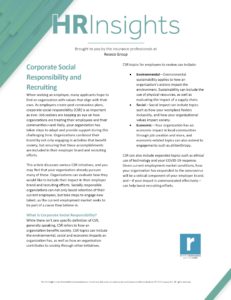 When seeking an employer, many applicants hope to find an organization with values that align with their own. As employers create post-coronavirus plans, corporate social responsibility (CSR) is as essential as ever.
When seeking an employer, many applicants hope to find an organization with values that align with their own. As employers create post-coronavirus plans, corporate social responsibility (CSR) is as essential as ever.
Job seekers are keeping an eye on how organizations are treating their employees and their communities—and likely, your organization has taken steps to adapt and provide support during this challenging time. Organizations can boost their brand by not only engaging in activities that benefit society but ensuring that these accomplishments are included in their employer brand and recruiting efforts.
This article discusses various CSR initiatives, and you may find that your organization already pursues many of these. Organizations can evaluate how they would like to include their impact on their employer brand and recruiting efforts. Socially responsible organizations can not only boost retention of their current employees but take steps to engage new talent, as the current employment market seeks to be part of a cause they believe in.
What Is Corporate Social Responsibility?
While there isn’t one specific definition of CSR, generally speaking, CSR refers to how an organization benefits society. CSR topics can include the environmental, social and economic impacts an organization has, as well as how an organization contributes to society through other initiatives.
CSR topics for employers to review can include:
- Environmental—Environmental sustainability applies to how an organization’s actions impact the environment. Sustainability can include the use of physical resources, as well as evaluating the impact of a supply chain.
- Social—Social impact can include topics such as how your workplace fosters inclusivity and how your organizational values impact society.
- Economic—Your organization has an economic impact in local communities through job creation and more, and economic-related topics can also extend to engagements such as philanthropy.
CSR can also include expanded topics such as the ethical use of technology and your COVID-19 response. Given current employment market conditions, how your organization has responded to the coronavirus will be a critical component of your employer brand, and—whether your impact was communicated effectively—can help boost recruiting efforts.
Reporting
Organizations can consider formally reporting their CSR initiatives—there are formal standards of which organizations can use to report on their efforts, such as the Global Reporting Initiative (GRI). GRI creates guidelines to report on the environmental, economic and social impact an organization has. According to GRI, 93% of the world’s 250 largest corporations now formally report on sustainability.
While formal reporting isn’t necessary for every employer, it can be used to establish accountability and quantify the impactful work your organization is doing to benefit society.
Why Corporate Social Responsibility Is Important
Employees seek to be part of a greater cause. According to a survey conducted by the Institute for Corporate Productivity, 62% of workers reported they wouldn’t work for an organization if they disagreed with its stated beliefs.
Notably, younger generations such as millennials and Generation Z disproportionally care about corporate social responsibility and hope to be part of an organization that shares their values.
Generation Z
Those born between 1995 and 2010—are beginning to enter the workplace. Estimates show that by 2030, Generation Z could make up over half of the workforce. Generation Z does not purely create opinions about companies due to the quality of their products or services and are interested in their ethics, practices and social impact. According to LinkedIn, 77% of Generation Z says a company’s level of commitment to diversity would ultimately influence their decision to work there.
These topics are important to Generation Z—and an effective CSR strategy can not only have a positive effect on society, but help a company with its recruiting efforts.
While employers should create business practices that are inclusive to all employees, trends indicate that an increasing number of job seekers have strong opinions about social causes—and an organization’s mission and impact will influence their employment decisions.
Corporate Social Responsibility and Recruiting Integrating CSR into recruiting practices can help ensure your recruiting efforts are hitting relevant topics. When doing so, considerations include:
- Implement CSR into your employer brand— Whether it be your careers page, online platforms such as LinkedIn or marketing materials, include your corporate social responsibility initiatives as part of your employer brand.
- Focus on the why—CSR extends to the core impact of your products and services, including your mission statement. Ensure job seekers are aware of your mission statement and what your values are.
- Include CSR as part of recruiting efforts—Job candidates may want to talk about the impact of your organization—and the impact that they will be making. Be ready to discuss your CSR initiatives with candidates as they apply and interview for positions with your organization.
These are some starting points—CSR can be heavily integrated into your organization’s internal and external communications.
Aligning Corporate Social Responsibility With Recruiting Efforts
CSR can encompass formal programs, or even small efforts such as the goodwill that your organization brings. Efforts will look different for every organization, but leaders can consider how their positive impact on society goes hand-in-hand with their employer branding and recruiting efforts. Consider initiatives that work for your organization, and contact Reseco Group for additional resources regarding employer brand and recruiting.
This HR Insights is not intended to be exhaustive nor should any discussion or opinions be construed as professional advice. © 2020 Zywave, Inc. All rights reserved.


